Accelerate Rollup Deployment with EigenDA's RaaS Marketplace
Teams are launching high performance, low cost rollups and rollup services on EigenDA. In this post we’ll take a look at some of them and learn how you can get started building your own rollup.
Rollups as a Service (RaaS) provide everything you need to build, customize, and deploy a new chain.
They are drastically lowering the barrier to entry for building and deploying customized blockchains and are reshaping the landscape of web3 infrastructure.
Why RaaS?
- Customization and flexibility. RaaS platforms provide a range of customization options, allowing you to tailor chain to specific use cases and needs. You can choose the underlying rollup architecture (e.g., Optimistic, ZK, or others), select the native token, configure gas, configure the sequencing mechanism, and integrate with infrastructure providers like coprocessors, oracles, bridges, indexers, and explorers.
TLDR: they enable teams to more easily solve specialized problems. - Reduced technical overhead. Building and maintaining a rollup network from scratch is complex and resource-intensive, requiring a lot of specialized knowledge and ongoing maintenance. RaaS abstract away much of this complexity, handling tasks like node operation, software updates, and infrastructure management. This reduced technical overhead allows teams to focus on building their applications and core business logic.
- Ease of deployment. Many RaaS providers allow you to deploy a fully-functional rollup with just a few clicks, eliminating the need for extensive technical expertise or complex setup processes. This empowers more teams and individuals to experiment with and build on top of rollup technology.
Before diving in to the ways you can get started building, let’s talk about EigenDA and data availability, the primitive that unlocks these capabilities.
Data availability and EigenDA
Data availability networks are dedicated systems designed to provide a secure, decentralized, and scalable way to store and retrieve transaction data, enabling rollups to offload data availability requirements and focus on execution, improving throughput and reducing costs.
EigenDA is a data availability store for rollups made by Eigen Labs, built on top of EigenLayer as an AVS, enabling high throughput and low cost transactions at scale.
EigenDA is:
- Scalable. Write throughput scales linearly with number of operators. At launch EigenDA will provide 10 MB/s of write throughput, around 5x greater than the nearest competitor. EigenDA write throughput will continue to increase by scaling linearly with its number of operators.
- Secure. EigenDA is decentralized, and made up of thousands of operators registered in EigenLayer whose delegated stake imposes an economic cost to misbehavior, and will have billions of dollars of economic security at launch.
- Cheap. EigenDA blockspace pricing is primarily constrained by cost-of-security, which is shared with Ethereum and other EigenLayer AVSs. As a result, we expect EigenDA to be orders of magnitude cheaper than competitors.
- Ethereum-centric. EigenDA blob writes are registered with contracts on Ethereum, which natively holds operators to promise of attestations. Ethereum L2s using EigenDA avoid any trust assumption on another chain's light client, which can be fooled by dishonest validator sets.
Some teams who’ve chosen EigenDA for data availability include Mantle, Polymer, LayerN, Versatus, Movement Labs, Cyber, and MegaETH. You can see some of the teams and products building rollups and rollup services on EigenDA here.
Customizing and deploying a rollup on EigenDA
Let’s take a look at some of ways to get started building your next rollup, and the different features RaaS providers offer.

AltLayer with EigenDA
AltLayer is a decentralized protocol that facilitates the launch of rollups with both optimistic and zk rollup architectures. You can choose between rollup stacks like Optimism, Arbitrum, Polygon CDK, or ZKSync.
They provide integrations with block explorers, oracles, bridges, on-ramps, indexers, and more.
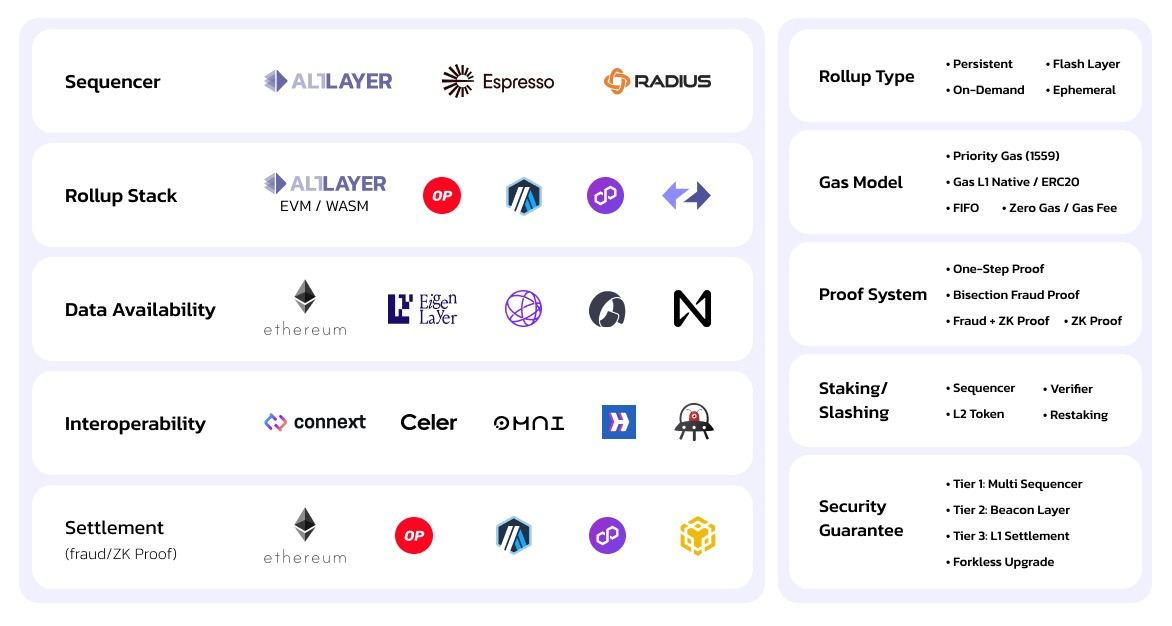
They offer two types of Rollups: Native rollups as a service and Restaked rollups as a service.
Restaked rollups
Restaked rollups are different in that they leverage EigenLayer’s restaking mechanism to make the rollups more decentralized, secure, interoperable, and faster
Restaked rollups are rollups that depend on one or more of 3 AVSs built on EigenLayer for verification, fast finality, and decentralized sequencing.
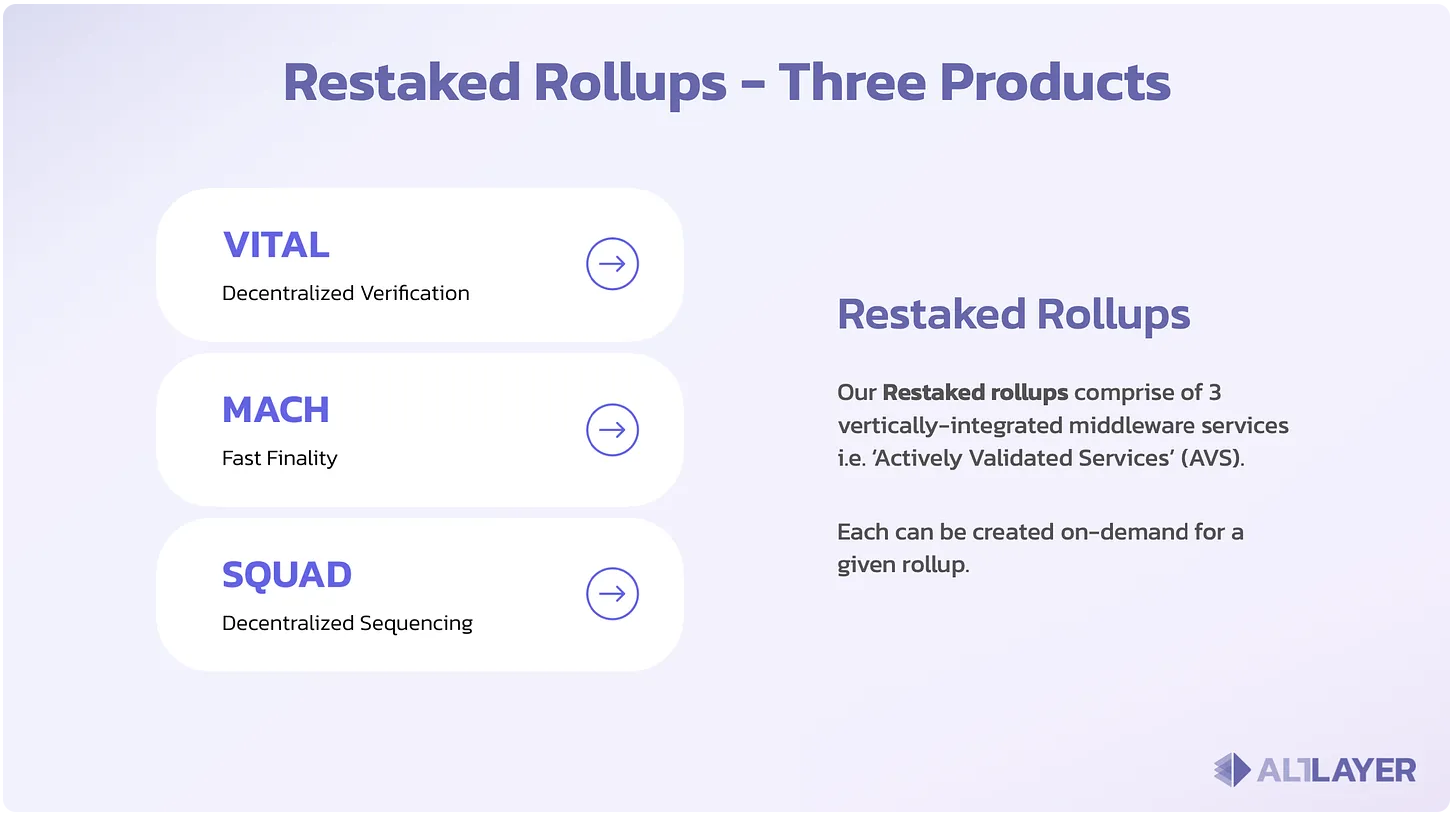
AltLayer offers white glove, 1 on 1 support in setting up everything you need to deploy a custom rollup. The best way to get started building with AltLayer is to reach out to their team.

Conduit with EigenDA
Conduit enables developers to deploy fully-managed, production-grade rollups on Ethereum. They offer a way to deploy rollups directly through their UI and dashboard in just a few clicks and with no code required.
Conduit supports launching chains using both the OP stack as well as Arbitrum Orbit, and have deployed with customers like Zora, Aevo, and Gitcoin.
In addition to choosing a custom framework and data availability layer, you can also choose a custom settlement layer (like Ethereum, Base, Zora, or Mode).
Along with your deployments you will also get access to logs, monitoring, a Blockscout explorer, and samczsun's transaction tracer. You'll also automatically get access to new components as Conduit ships upgrades.
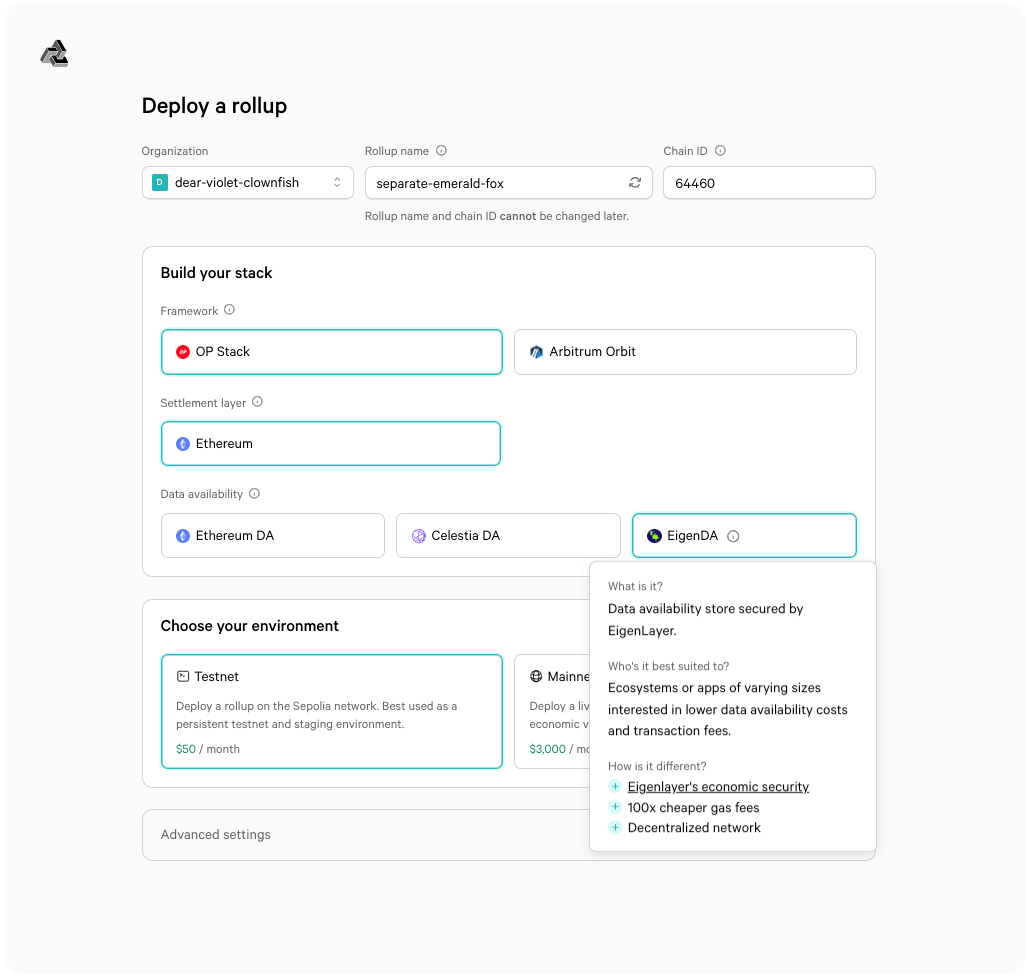
You can get started building on Conduit with EigenDA here.

Caldera with EigenDA
With Caldera you can deploy EVM compatible rollups in one click, launching with OP Stack, Arbitrum Orbit, and Polygon CDK.
They allow choosing between shared or decentralized sequencing and allow you to choose any token as the native, fee-paying token of your chain.
Caldera rollups come with performant RPC nodes, a block explorer, a data indexer, and a bridge interface to the settlement chain. Caldera rollups also benefit from integrations with 40+ infrastructure providers.
Caldera will soon support EigenDA as an option when configuring your rollup with custom data availability.
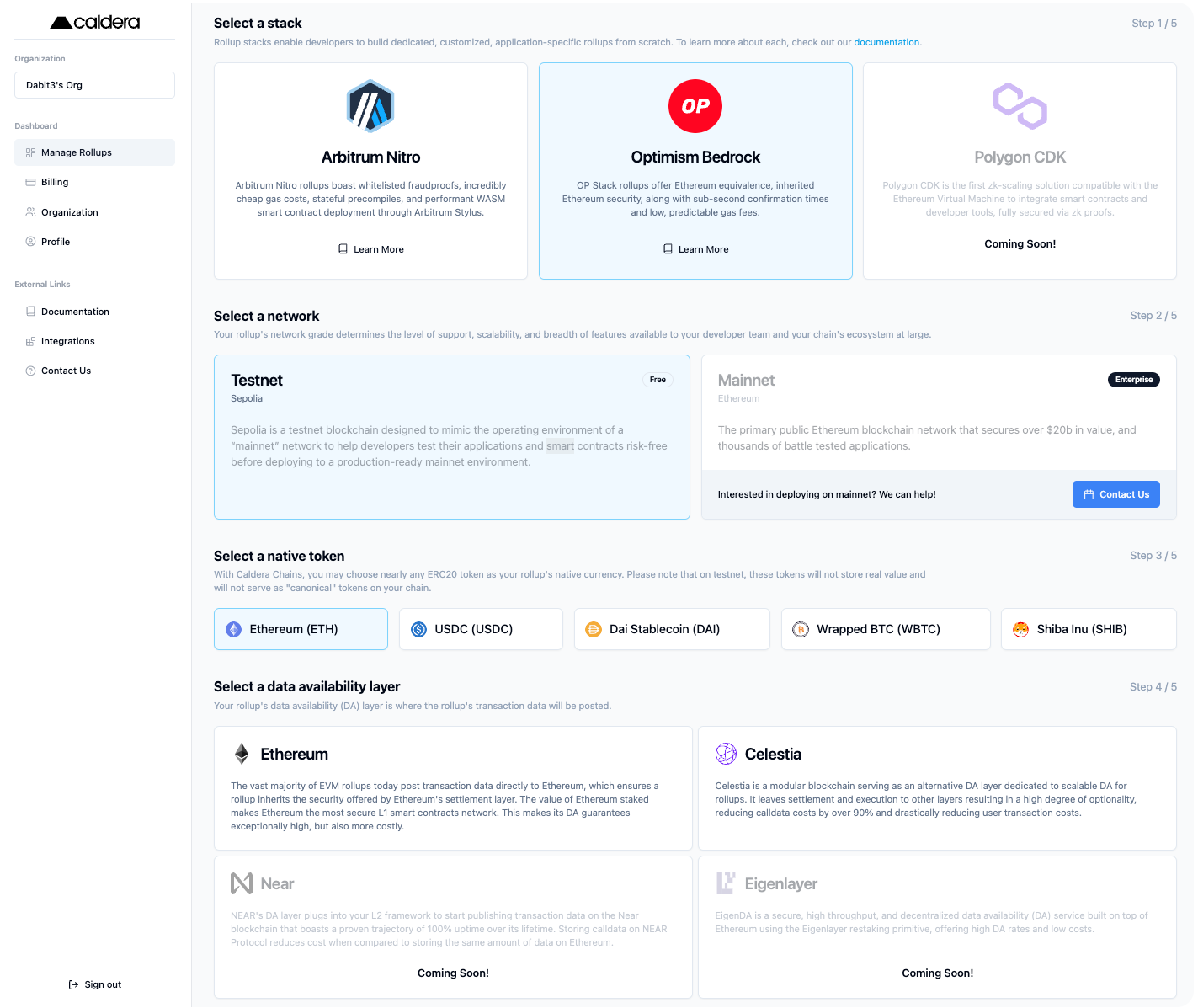

Gelato with EigenDA
Gelato offers an all-in-one Ethereum Rollup as a Service Platform.
With it, you can deploy production-grade & fully-serviced L2 and L3 rollups at a pace natively integrated with 25+ infrastructure providers and developer tooling like oracles, bridges, indexers, block explorers, fiat on and off ramps, and account abstraction.
You can customize your chain specification to suit your project's unique requirements without any coding required, such as flexible sequencer design, native token, and alternative settlement layers.
Choose to deploy with Optimism OP stack, Arbitrum Orbit, Polygon CDK, or zkSync ZKStack with L2 and L3 rollups like Astar, Lisk, Playnance, Re.al and Reya in production today.
Gelato will soon enable rollup deployments with EigenDA on test & mainnet and rollups restaking as part of their product offering.
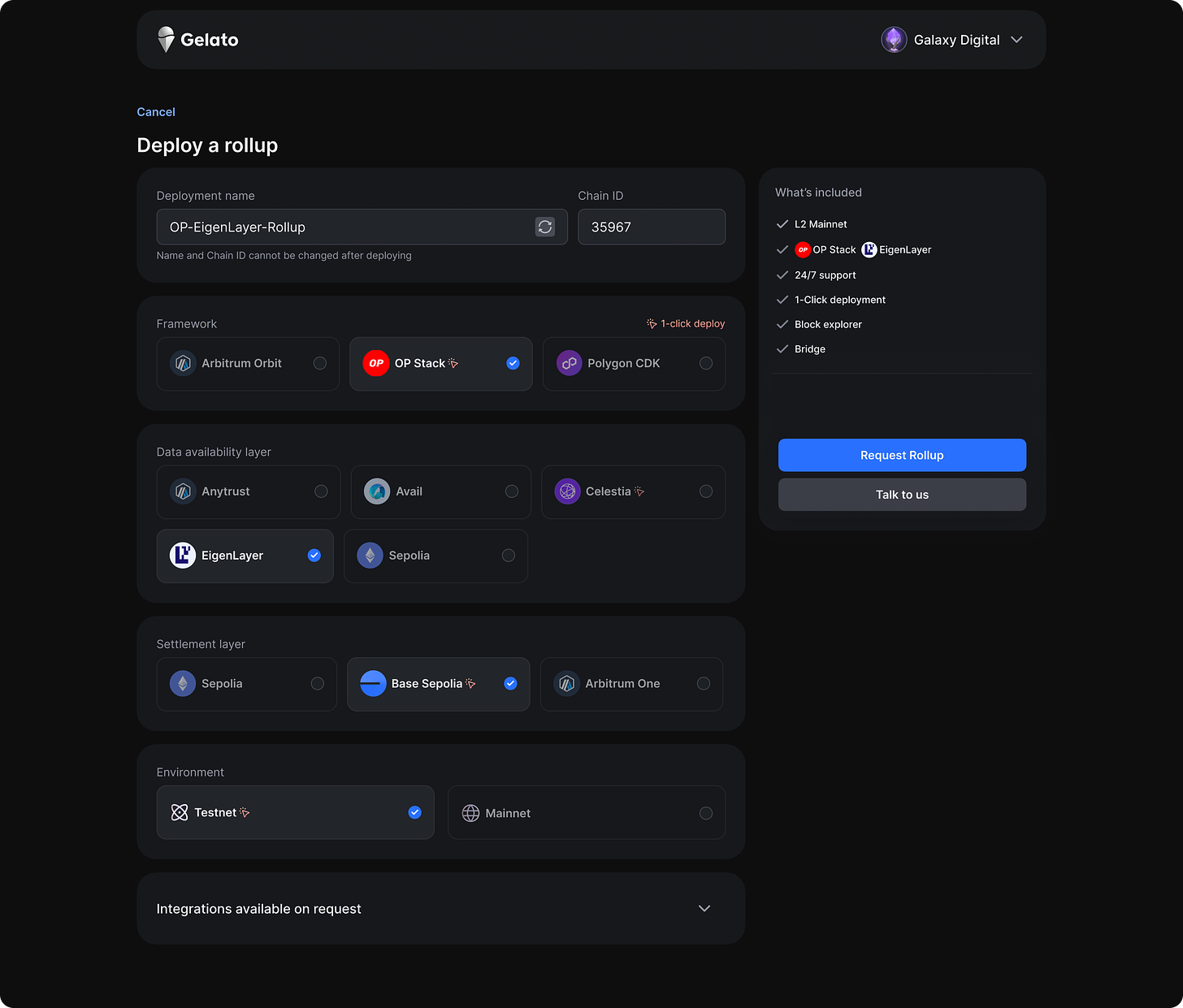
What next?
With rollups becoming easier to customize and deploy, a completely new design space is opening up. We’ll continue to see more growth and experimentation, with teams building chains for specialized and specific use cases that in the past would not have been feasible.
There is also a new ecosystem of protocols on EigenLayer popping up like oracles, sequencers, coprocessors, and more catering to these new networks.
Like smart contract blockchains ushered in a new wave of innovation for app developers, rollups are doing the same for developers and teams interested in building their own networks. Rollups are the new smart contracts.
